Ep. 1: And all that beauty, all that wealth e'er gave
40 min. read
Notes from the 9th-13th of January
I'm opting for a slightly different format this week around, dropping the day-by-day exposition in favour of letting the major themes from the week bubble-up in a more natural fashion. This is mostly because, and will become increasingly so going forward, every day of classes is identical to any other within some small rounding error, that error being the one or two small moments in the day which characterise it in memory. It is these small moments I would prefer to focus on in subsequent writing, though I'll take the time now to cast some light on the general schedule for this semester in the interest of completeness.
The structuring of credits works quite differently here than in Melbourne1. At home, the model is 6 credits per unit, and a full course load consists of 24 credits (that is, four units) per semester. Underloading is 18 credits and overloading is 24 credits. These are your three options (unless exceptional circumstances permit). There is significantly more flexibility here in US colleges.
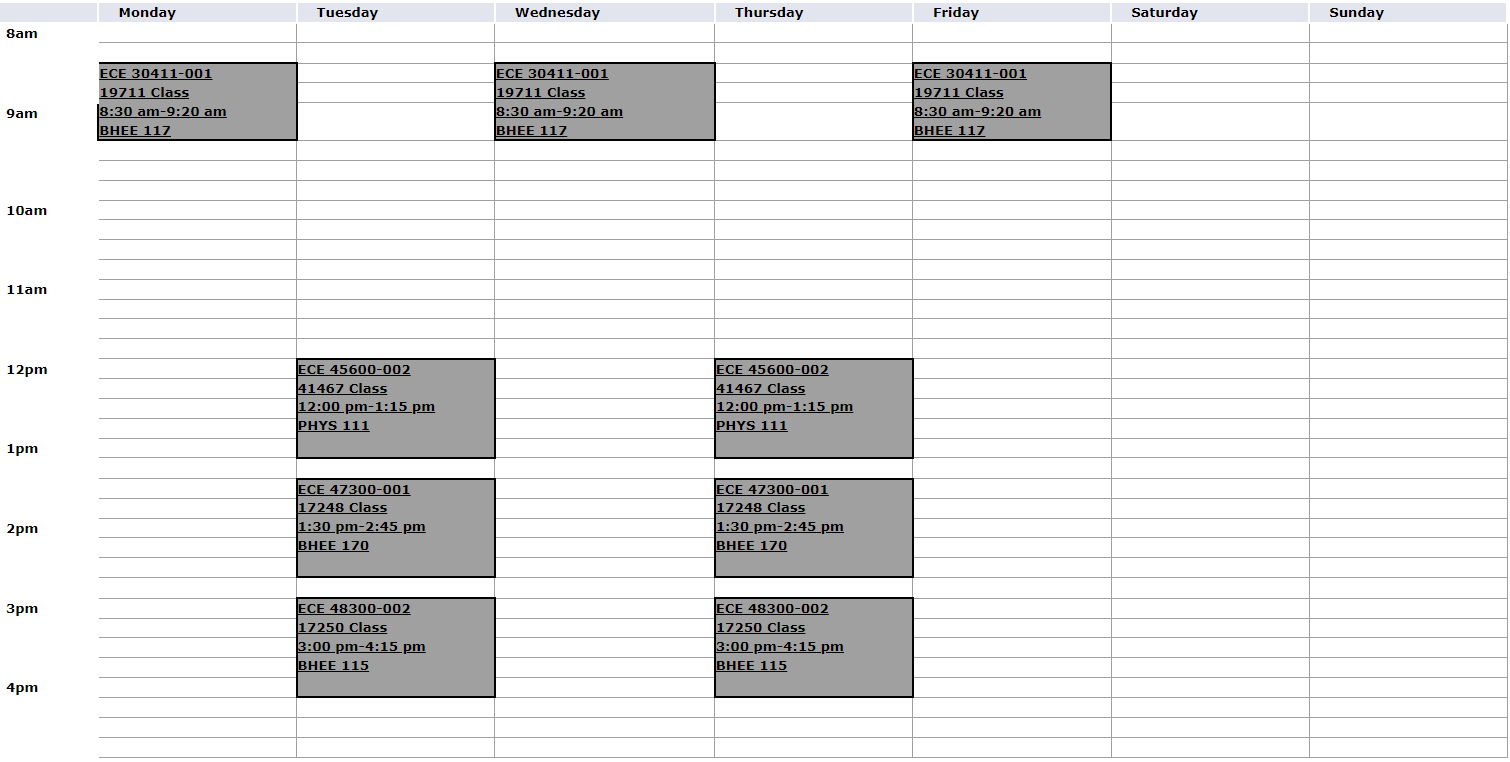
Each of the units I am taking this semester is worth 3 credit hours. Four units, so that's 12 credit hours. This is the minimum requirement I have to meet to maintain my student visa status here in America. However, each of these units only consists of lectures - there are no laboratories; these are run as separate units, usually worth between 1-2 credit hours. And so, the number of credit hours that any one person is taking can vary wildly, from 12 like I am, down to 9 if you are a domestic student underloading, right up to the low 20s. The customisability is welcome, to be sure, but I am a little confused to grasp why the laboratory content of a unit is not bundled in with the main lecture material. The separation of concerns is an interesting one. The only advantage I can see is prolonged exposure to a particular topic, almost like a structural form of spaced repetition.
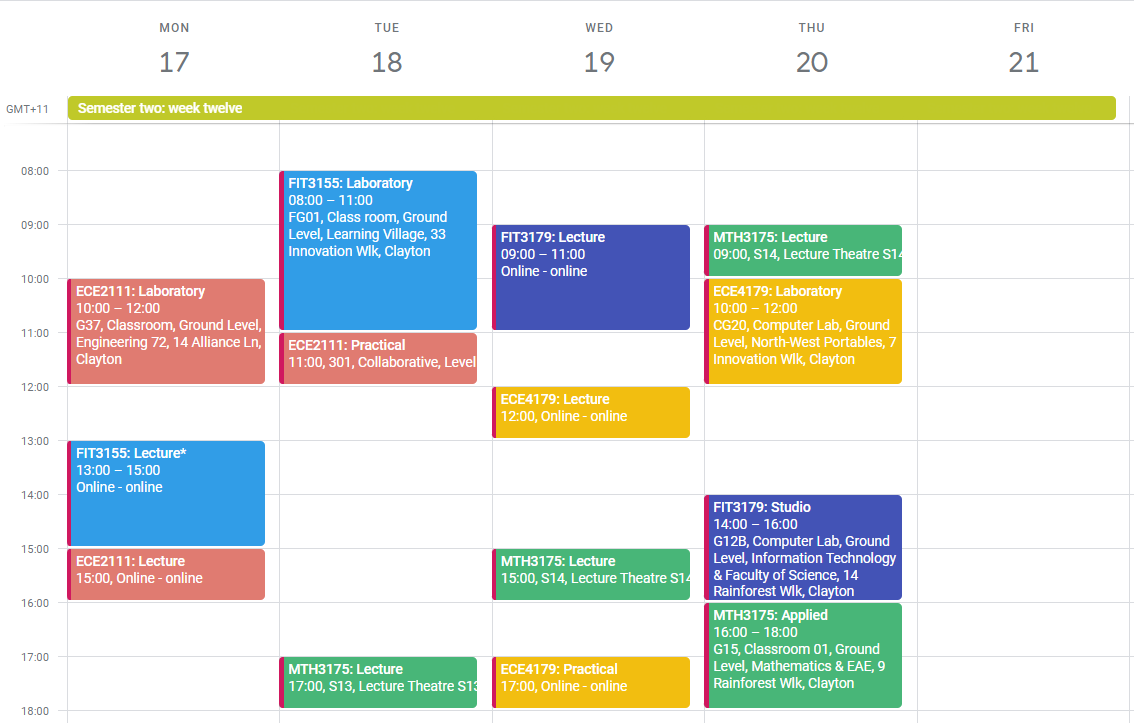
The other thing, whose implications will be discussed in greater detail later, is that whilst the contact hours for my semester at Monash are notedly higher, the actual number of hours I was in class for is markedly less. For one, the lectures were not compulsory, nor were many of the labs. For two, the culture around class attendance in Australia is quite different, particularly in a post-COVID era. And thirdly, having gone through the system a few times, having found some shortcuts, and finding myself overloading, meant that expediting the time to acquire the new knowledge and material was a necessity to survive. The approach for this semester at Purdue couldn't be any further from this.
On Classes at a New University
Let's start with what classes I am actually taking:
ECE 30411 - Electromagnetics I. Electromagnetics is a core part of any good electrical engineering curriculum, and was something that I would otherwise have taken last semester at Monash, had I not anticipated coming here on exchange. It was a bit of a gamble to skip it, but I am glad for it because I would have struggled to make up units here at Purdue. Were I staying around for another semester, I'd be rather keen to take the successor to this course, Electromagnetics II, as it is a topic I'm quite interested in. If anything, it is the return to a very maths-heavy, physics-heavy subject that is the draw, in contrast to traditional electrical engineering.
ECE 47300 - Intro to Artificial Intelligence. This is the second of two technical electives I have to take to satisfy my course requirements at Monash. Last semester I took Neural Networks and Deep Learning, so this is very much more of the same. The disjunct comes with this unit having more of a focus on traditional AI systems, as well as a broader coverage of machine learning algorithms, computer vision and neural language processing2.
ECE 45600 - Digital Integrated Circuit Analysis and Design. This is the unit I am most concerned about. For one, the content is by far the most challenging. On top of that, I am fairly certain that if they knew the units I had taken that I am claiming are "prerequisities", they probably wouldn't let me take the course. The final straw is that I have to pass this unit if I want to finish my degree in the middle of next year. If not, I run into prerequisite errors of an entirely different kind back at Monash when it comes to selecting my units for the next semester. With all that said, I am rather looking forward to the challenge that this will pose. The content is, to be fair, quite interesting. Basically it looks at how to optimise processor/chip design beyond using software like hardware description languages. Because 13th gen Intel chips and Apple's new M2 chips actually require a lot of human input into the design process to make them so freaking fast.
ECE 48300 - Digital Control Systems Analysis and Design. The third and final core unit I am taking. I feel fairly comfortable about this one, particularly because it has a large focus on discrete signals and systems, which is something that I took only a semester ago.
Now that we're up to speed on what I am studying, let's examine my thoughts on the first week of classes. In a few words: mostly impressive with a few red flags. I have found the overall quality of the lecturers to be at or slightly above expectation. The clear winner here is Michael Melloch, the professor for the electromagnetics unit. He has all the attributes I look for in a worthy teacher: a great public speaker with clear diction and expression, a depth of knowledge of the field, empathy for his students and their learning struggles, and a passion for his subject and more broadly the pursuit of learning. Funnily enough, his is the least academic background of the four lecturers I have, having worked in industry for most of his life before returning later to his old school to teach3. And, whilst only scratching the basics of the subject, the fact that he adds at least once a week a note on metalearning (the study of how to learn) is terrific, since it is something so poorly taught at in high school, completely forgotten about in tertiary studies, and totally misunderstood and flatly underappreciated by 99% of students.
And, whilst it is perhaps marginally unfair to make sweeping judgements in the first week of classes, especially because the first few classes are mostly engaged in reviewing prior content, the other lecturers handle themselves well enough. One thing I had perhaps hoped for a little more from were the facilities, though admittedly it will have zero impact on my learning and is more just an aesthetic thing. It seems I managed to select out from the hat another university which, like Monash, has electrical engineering buildings that on the surface appear to pre-date the founding of their respective countries. In fairness, I am not taking any lab classes this semester and so the rooms require little more than blackboards and projectors. Furthermore, parts of the electrical engineering building have been renovated in recent years, and the adjacent building (Material and Electrical Engineering - what a strange combination) is brand new essentially and a pleasure to go and study in.
As far as my fellow classmates are concerned, they do a convincing job of at least giving the impression (genuine or otherwise) of being very academically engaged. Whilst I haven't met someone in my classes yet that has floored me with their immense intellect, a first-order approximation would have to give Purdue students the advantage for average academic ability over my Monash cohort. This even more so in light of the fact that upon finishing high school, most Victorians entering into engineering at Monash are at a considerably higher standing in the maths and sciences than their American counterparts, so the fact that they are able to catchup in a matter of semesters is a compelling argument in favour of their tertiary education system.
One bone that I have to pick, but which doesn't wholly affect me, is regarding textbooks. It is straight up blasphemous to me that many units friends of mine are taking require them to purchase textbooks (renting or buying outright) in order to satisfactorily complete the unit. More puzzling is that some of these textbooks aren't even physical copies, but digital editions. I get that a professor might wish to make a textbook required reading, and even go so far as to draw homework exercises from it, but to enforce the purchasing of the book due to it constituting more or less the backbone of the curriculum is academically lazy in my opinion. Yes, you can get a reasonable deal on some used textbook rental from the university book stores, but in many cases supply ran out and people were forced to buy outright new books. As far as money-making propositions are concerned, it's a winner. As far as benefiting the student is concerned - well, it seems hard, if not impossible to justify. Particularly because in this era tools (that I have definitely, never ever, will never, couldn't ever, refuse to ever, use like Lib Genesis) give you access to PDF copies of the textbooks for free.
On the topic of money-making schemes. I had initially formulated an idea of auditing at least in the first couple of weeks a math unit offered here (that I had wanted to take, but had to swap out for an electrical engineering unit) in the effort to see what the academic rigor of the math department was here at Purdue (Monash's is quite strong in Australia). At Monash, auditing is something you can do for free, so long as you ask the professor first. Here, though, even auditing the course requires that you pay the full tuition fee for that unit. What. Why? You are paying to sit in the room and learn...
Of course, one needn't notify the professor of their intentions, but in principle it is something that I cannot stand either, particularly where the cost of attendance (or what would have been the cost of attendance for an international student like me if I wasn't here on the exchange program) is ludicrously high.
On Habit & Routine
When I'm at home, and above all when it is semester time, just about everything I am doing falls into a fairly tight routine. From what I eat, to when, to when I study, to when I work out, everything is accounted for in apple-pie order. So, the greatest indicator of whether I am surviving or thriving in a given setting is how long it takes me to move from turning to matters on an ad-hoc basis, to turning to them in a highly systematic fashion. In my eyes, it bodes very well for the rest of my time here I hope, that such a space began to be occupied even by the middle of my first week of classes.
Naturally, the way that I am structuring my time here will differ from how the calendar looks during a normal week in Melbourne, and the variation is entirely due to the different objective functions that I am optimising with respect to. At Monash, the driving vector is being as effective in my studies as possible so I can get the highest possible marks whilst still having the time to pursue further technical matters like student teams, self-learning and reading. Here, the motto is minimising time spent studying whilst ensuring I comfortably pass[^6] in order to free up as much time as possible for exploration and discovery to reign supreme.
Sure, there are some technical matters I wish to attend to whilst I'm here. With applications for summer internships around the corner, I want to revise some topics here that are guaranteed to come up in assessments. However, such items in my weekly calendar should be in the exceeding minority.
One topic worth addressing here is common perceptions of spontaneity. After all, some of the best and most memorable moments happen when we drop everything and just go with the flow. This can be true, but for the past few years I have heavily subscribed to the modus operandi of intentional serendipity. In short, the idea that the amount of these lucky encounters you experience is not fixed, but can be significantly increased by purposefully allocating time in which you put yourself in the exact settings where such moments can effervesce. For instance, I've allocated an hour or so here and there throughout the week to just walk around the campus, in and out of buildings, just with my camera taking pictures. Already such a practice as yielded great fruits, and I expect this to continue. And if not allocating time in this fashion, at least baking in this intentionality to other areas of life where possible. As an example, most of the time at the dining courts I am sitting there by myself (don't feel too bad for me!) but one thing I am resolving to do here is sit down next to someone else or a pair and start chatting to them. Most of the time the conversation stalls due to lack of reciprocated engagement, but occasionally a spark catches and good faith takes over. In the former case, the great thing is that I can just up and leave once I finish the plate of food and relocate elsewhere, so large are these courts. So it's really a non-negative sum game all around.
A temptation that I am mindful of at this time though is that because I am in an apartment, with it comes a personal room, a desk, a quite space to study by myself. I can get all my books out, paper strewn everywhere and really get some deep work done. Or at least I have the impression that this could be the case, and the thought of deep work always excites me. However, this is not aligning well with my objectives for being here, in fact it runs almost perpendicular to them. The chances of serendipity as outlined above in this context are effectively zero, and it is no way to strengthen existing connections. I am aware of the attraction to stay here though, and like anything awareness is the first remedy. Scouting out good libraries and communal study spaces around campus replete with opportunities to interact with others is high on the priority list going forward.
On Meeting New People
The two highlights from the week (other than the basketball game, see below) were the welcome reception for exchange students and the PASSPORT callout (a group for inbound/outbound Purdue exchange students).
On an exchange such as this, making new friends or at the very least new connections is an imperative for an enjoyable and unique time, yet you quickly realise the tallest hurdle being run into here is that forming a relationship of any sort with local students is significantly more challenging. In any such interaction, their and my incentives are running along completely disjunct streets, so finding a point of intersection, a common seat of interest can be challenging. I am there actively seeking acquaintances, they are there to maintain the status-quo and more firmly embed their present friendship circle. So a successful mixing reaction here can have a fairly high activation energy. The catalyst, at least to this point, has been the singular fascination generated by most Americans here with respect to Australia and Australian culture. Call it insularity, but there is this deep impression of our country being (perhaps due to its geographical position) culturally far flung from the rites and rituals of the US. The reality of course is anything but, since Australia, lovers of importing the social memes, music and movies from Hollywood to New York, is becoming ever more congruous to the States. But in the interest of sustaining this intrigue, I shall gladly propagate the deadly nature of our snakes and spiders, the myth of dropbears and the general lackadaisical undertone of Australian life
It is because of this that these two exchange events were of such import to me. Finally, a chance to meet people who are mutually inclined to become friends and hang out as often as possible. And the diversity of the pool here was so wonderful - Colombians, Italians, Spaniards, Swiss, Germans, South Koreans, Singaporeans and yes a few other Australians in there. So resonant was the interest in building up relationships with these people, that within 24 hours of meeting them for the very first time on the Wednesday, I had organised with a group of 7 others an impromptu trip down to Chicago for the long weekend (Monday was Martin Luther King Jr. Day).
On Purdue vs. Monash
During the week I attended a callout (information session, or expression of interest) for what is known in America as Co-Op. This is similar to programs at Monash in computer science and software engineering where you can take a semester to work full-time professionally at some company or another and have this transferred back as credit to your original degree. Differences are that most people here in Purdue do a full year away, and hence extend their degree to five years, and the quality of companies that one can apply to (along with the renumeration received) is significantly stronger than at Monash. Along with this were pitched career fairs taking place early in February, and again, I couldn't help but be impressed by the scale of the companies coming to campus - Tesla, Boeing, etc.
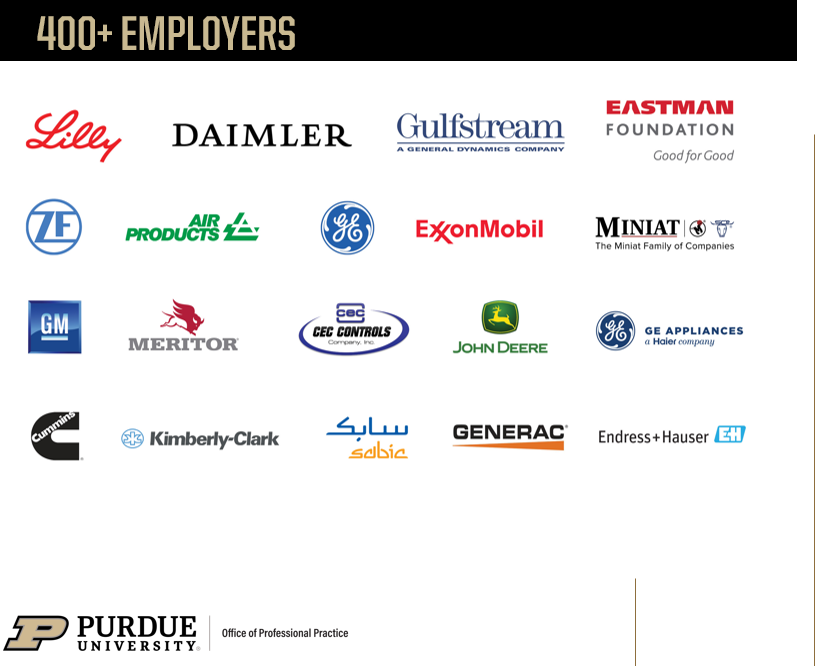
It was during this session that I had a revelation of sorts, that the best thing about coming to a place like Purdue in terms of my academic journey is not the classes I am taking this semester, but the fact that with completion of one semester here I immediately become part of the Purdue alumni network and all the opportunities such as the above entailed therein. This seems like a bit of a cheat code, especially when contrasting the difficulty of undergraduate admission to Purdue against the (relative) ease with which I got in on exchange. So, whilst I will at this point be unable to take up any of the domestic offerings at these career fairs, my intentions are to go to as many of these as I can and see what international opportunities might lie in wait. After all, it is probably the last time at university I will get access to this calibre of companies.
The full PowerPoint presentation from this evening can be found here.
On (Cultural) Differences
I thought it might be worthwhile to begin compiling a list here of small idiosyncrasies I've noticed in the behaviour of our American friends. Most of them are so minor as to be unimportant, but perhaps you might wish to infer from these cultural oddities some conclusions about the state of the US:
Many states, including Indiana, do not require a vehicle to be fitted with a front license plate. This is something I was hit with when browsing the book store and noticing shiny gold Purdue plates you could buy for your car.
Zebra crossings are not pedestrian crossings. To my knowledge, any zebra crossing in Australia (or at the very least, Melbourne) is to designate a point at which cars must give way (in the US, yield) to foot traffic. A reality which is not met over here, a fact that hit me almost literally when a car impatiently stopped for me as I strolled out across the road at the crossing. In my defense, some of these crossings are to give-way, it it just incredibly invariable at which ones fall under this category.
On foot traffic, it's instinctual for me to chuck up a wave or thumbs-up for cars that stop to give way to me when crossing. Safe to same I am the only person here doing that, and have received some fairly quizzical glances from drivers as to whether they know me or not.
One non-cultural difference that has arguably been the greatest shock has been the weather. It just doesn't get down in Melbourne to the subzero temperatures I am experiencing here. I am quickly coming to love the cold though. The reason is that the warm, sunny weather I left behind invites a certain idleness, an inclination to lounge around and soak in the rays. This was certainly something I was guilty of spending hours doing prior to my departure. In these chilly conditions of Indiana, however, it is nigh impossible to fall so completely out of touch with the present moment. Indeed, I have found it really easy to sustain long periods of deep undistracted awareness, if only for the fact that the mind cannot wander very far before the biting winds, or falling snow, or the aching of numbed hands, yanks you very unceremoniously back to reality.
On Mackey Arena
On January 13th I attended the men's basketball game against Nebraska at Mackey Arena and had one of those experiences of such intense euphoria and excitement and gladness that you're kept up that night replaying over and over each detail in its minutiae. And, in doing so, I had my choice of Purdue so unquestionably reaffirmed in my own mind that it enabled me to breath a little easier, to not pay so much heed to any doubts or concerns I had had about whether I was in the right place.
The timing of my visit to West Lafayette could not have been any more opportune. The men's program is in the midst of its best season in school history4 and at the time of writing, they are the #1 team in the country. This is an everyday affair for some of the big universities that recruit heavily from out of state (Kentucky, North Carolina, Duke, etc.), the titan heavyweights of NCAA basketball, but for Purdue to do it with (all but one, more on that 7'4" exception in a second) home-grown talent is quite remarkable. And to top it off, Mackey Arena is universally heralded as one of the loudest, and toughest venues for travelling opposition to play in.
But yes, the one out-of-state recruit (that plays minutes) is Zach Edey from Ontario, Canada. The man is 7'4" (224 cm in the metric) and nearly 290 lbs. (130 kg). There is no one his size in all of college basketball, and I feel kind of bad for any bloke that has to rock up at Purdue after doing his PolSci homework or something and guard him. They just get bullied.
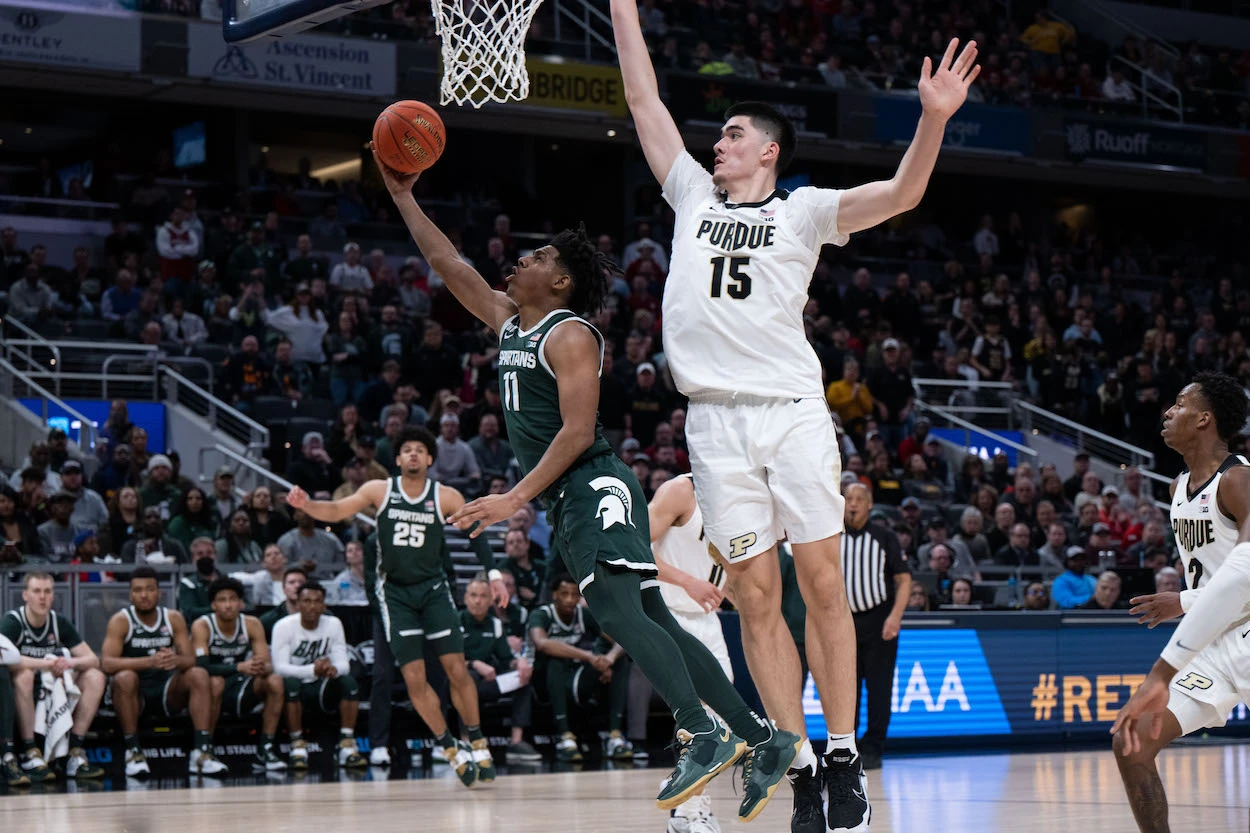
I had been to a college game many moons ago at North Carolina as part of the school basketball tour I was on, but we were in the back row of general admission. Even then, I recall how intense and electric the atmosphere was - before this trip, it was the benchmark for crowd volume at a sporting event. So suffice to say that my hopes for this match were through the roof. Not to mention that even getting the ticket was an ordeal in its own right. General admission tickets (the more expensive ones) sell out months in advance, and in a few weeks time, the student raffle tickets for the 2023-24 season will go on sale and sell out almost immediately. This is not like the footy where you can rock up at the gate 5 minutes before the bounce and secure a decent ticket. No, no. For this, one must join group chats, discord servers, even scour the dark web if desperation wins out, and compete relentlessly to try and secure a ticket. In my case, this meant sitting in a message board where people posted if they were selling tickets, immediately messaging said people, and then hoping that they clicked on my private message first. As an international student, I ran into further problems still.
The preferred method of payment is Venmo, the American-only version of PayPal, which of course meant that I was futilely trying to convince people to let me bank transfer them or pay them through other means. Of course, since they are receiving several offers at once, they will take the path of least resistance, which at this point ran tangent to me.
Tickets are managed via a 3rd-party portal for which students can link their ID number to to ensure valid transfers. Of course in setting this up, I made a public account first (though still with my Purdue email) and so subsequent transfers for student tickets errored because they can only be between ID-linked accounts5.
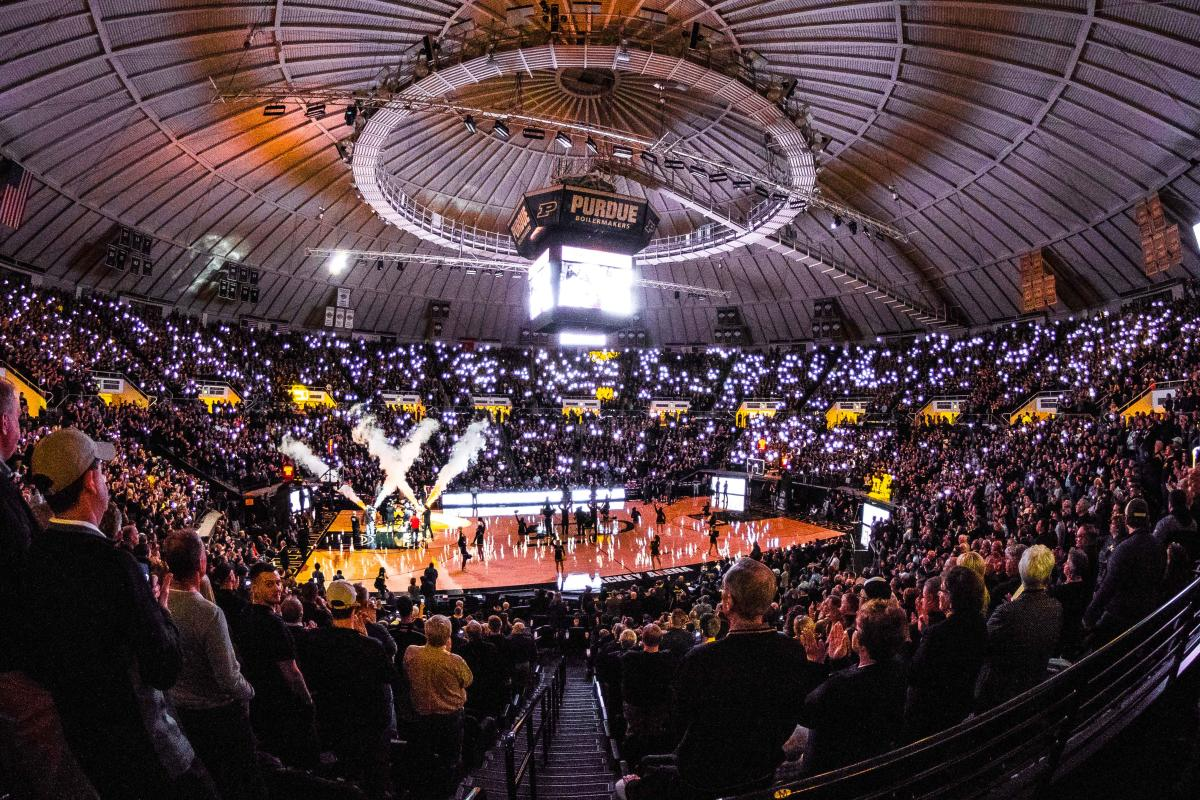
With all that aside, for my first game I lucked out in finding a PayPal holder, but errors with the ticket transfer meant I rocked up to the game with only a QR-code screenshotted on my phone as my way in. As I usually do for sporting events, I wanted to bring a backpack along to put my jacket in, food, camera, etc. The arena itself is situated at the end of the long North-West running University St and you can see it looming in the distance from a mile (literally) off. Seating in the student section is a free-for-all, so I left plenty of time to get there, especially going by myself without anyone to hold my place. Finally reaching the front door, anticipation was at fever pitch and my mind was locked in on important considerations, like what the half-time entertainment would be...until I was rudely yanked out of my daydreaming by security telling me I had to leave immediately as this is a bag-free arena. No kidding. This information is usually communicated via email to ticket recipients but of course because I didn't actually have the ticket, I was left in the dark. Despite my sweetest pleas for one of them to take care of the bag, or to let me in regardless, I found myself on the jog back to my apartment to drop it off before returning. A costly detour, as the Aspire building is right on opposite end of campus, nearly 2 km away. Hot and sweaty, even in the sub-zero conditions, I finally made it back to the arena, nearly shrieked when my screenshot worked, and was moved to mild jubilation when I stumbled onto a ripper seat.
The atmosphere was indescribable. The low roof, 15,000-seat-capacity-crowd combined to create this immense air pressure and volume, like the largest ever subwoofer. Within about 30 seconds of just the player introductions, I had already resolved to do whatever I could to come to every remaining home game on the schedule, such was the power and sway of this place.
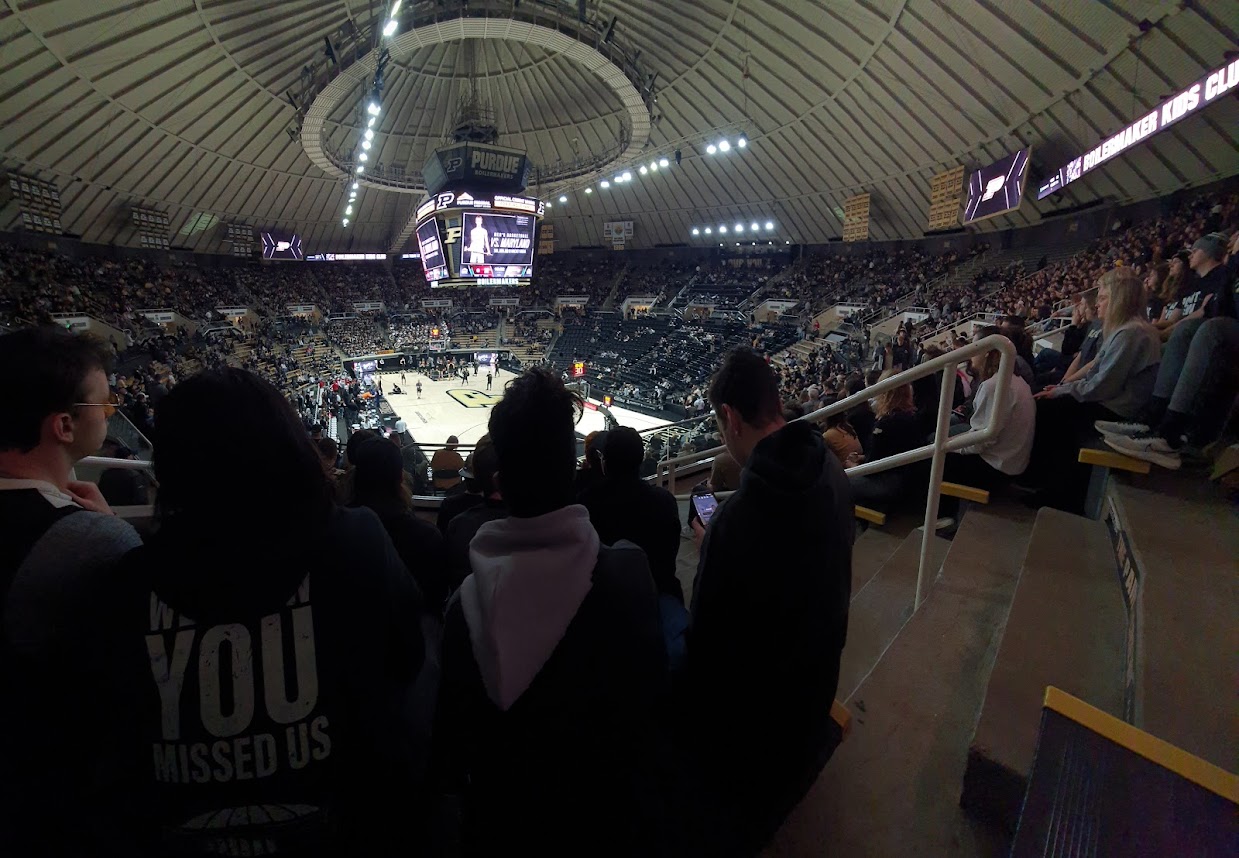
As for the game itself, Purdue won handedly as was expected. But I had the most wonderful time, lost in a swarm of fellow students, learning all of the chants, songs, claps, timings and idiosyncrasies that evolve around any such sporting team if given long enough. The thing I loved most of all, though, was easily the student band. Unlike professional sports where the often tepid enthusiasm from the crowd is artificially sustained by loud rap and organ music blasting from the speakers, here it was all entirely organic, a really dynamic sound sphere generated by this symbiosis between student voice and student band. Truly memorable!
Footnotes
- Or at least at Monash University↩
- Upon finding the links for the syllabus for these units (and the ones at Monash), I am realising how much of a chasm there is between the unit overviews (including the learning outcomes) and what we actually learn. In particular, the neural networks unit's overview had buzz-words like NLP which we hardly ever mentioned at all, only ever in passing.↩
- A career trajectory that I have often found myself considering very strongly↩
- And the women aren't doing too badly either↩
- An email to the ticketing department has since resolved this.↩
Ep. 0: A Prelude
Ep. 1.5: My Kind of Town